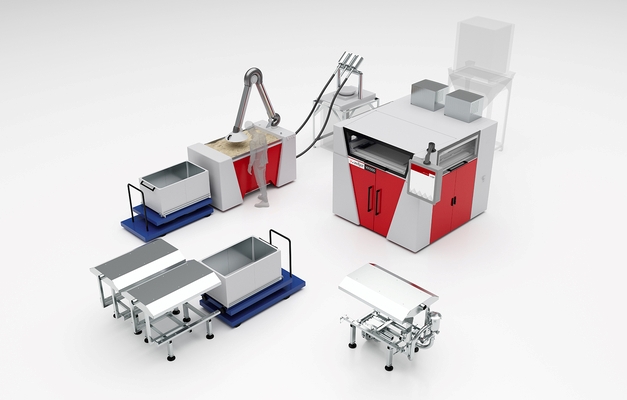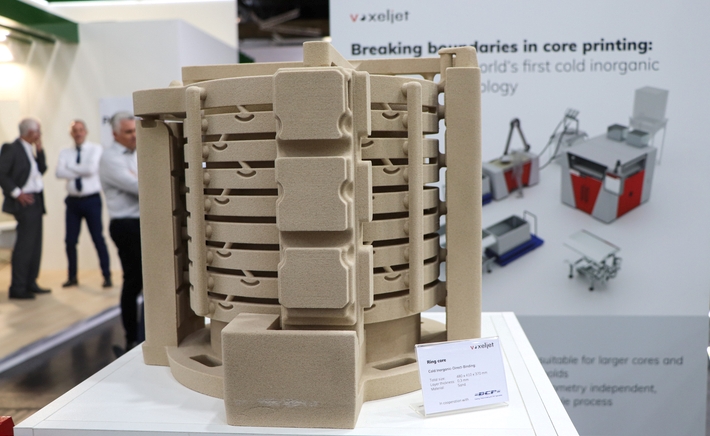Cold IOB (Inorganic Binding) 3D printing technology is a unique process that would enable molds and cores for the foundry industry to be produced from sand and an inorganic binder without the need for microwave treatment.
Developed as part of the ICP (Industrialization of Core Printing) project with Loramendi for BMW, the development of this machine enables machine manufacturer voxeljet to focus on inorganics products.
The ICP project involves a fully automated, manufacturing cell in operation at BMW’s light metal foundry in Landshut. Within this manufacturing cell, casting cores are printed with inorganic binders and then cured using a microwave. Consequently, it is a warm process technology.
The new cold IOB technology does not require a microwave curing and is thus characterized by lower investment and operating costs. The use of IOB technologies opens up numerous advantages for the foundry industry, e.g. only water vapor is produced during casting instead of harmful gases. This not only reduces emissions but also improves working conditions in foundries.
“The introduction of cold IOB technology is an important step towards further adoption of printed cores and molds with inorganic binders in the foundry industry,” says Dr. Ingo Ederer, CEO at voxeljet. “Our goal is to provide innovative solutions that not only increase efficiency, but also help promote the sustainability of metal casting.”
The features of the cold IOB process technology and molds and cores produced with it include high dimensional accuracy, very good detail resolution and edge sharpness, and the ability to 3D print large molds and cores. Unlike warm IOB processes, which require printed cores to be cured and dried using a microwave, voxeljet’s cold IOB technology only requires drying after printing, which takes place outside the machine. Customers thus avoid high investment and operating costs for industrial microwaves. The process can basically be used on all voxeljet platforms. It is currently being tested and offered on the VX1000 and VX1000S printers. An expansion of the offering to the VX2000 is planned soon.
The use of inorganic binder in the foundry industry, especially in the automotive sector, is gaining popularity. In view of increasing environmental regulations, demand for inorganic-bonded molds and cores is expected to rise continuously. voxeljet is committed to developing compatible 3D printing processes and to making a significant contribution to the sales growth of the voxeljet Group through this strategic orientation.
The cold IOB technology is particularly suitable for prototyping and medium series sizes and is now commercially available.
Remember, you can post job opportunities in the AM Industry on 3D ADEPT Media free of charge or look for a job via our job board. Make sure to follow us on our social networks and subscribe to our weekly newsletter : Facebook, Twitter, LinkedIn & Instagram ! If you want to be featured in the next issue of our digital magazine or if you hear a story that needs to be heard, make sure to send it to contact@3dadept.com







